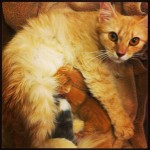I Don’t Know Nothin’ About Birthin’ No Kittens!
June 18, 2013
 Our foster cat Mango had her kittens just over a week ago. Strawberry, Pineapple and Watermelon are thriving! Mango is an experienced mama cat, and she has been taking excellent care of her babies. Things are pretty easy for me at this point, since Mango is meeting all the kittens’ needs. Around 4 weeks of age, I will start to introduce kitten food and a litter box to the little ones, and thats when things may get messy!
Our foster cat Mango had her kittens just over a week ago. Strawberry, Pineapple and Watermelon are thriving! Mango is an experienced mama cat, and she has been taking excellent care of her babies. Things are pretty easy for me at this point, since Mango is meeting all the kittens’ needs. Around 4 weeks of age, I will start to introduce kitten food and a litter box to the little ones, and thats when things may get messy!
This is my first hands-on experience with fostering a pregnant cat, and with birthing kittens. It has been an amazing learning opportunity. Fortunately, we rarely see unspayed cats and dogs, so pregnancies in our patients are rare. Most small animal veterinarians today have very limited experience with reproduction since we have been successful in convincing owners to spay and neuter their pets by 6 months of age.
What are some things to consider if you have a pregnant cat in your care?
1.) Gestation in cats is approximately 63 days, but this can vary a bit. Most times the date of conception is unknown, so we are left guessing as to how far along our patients are. Fetal skeletons are fully mineralized around day 42 of gestation, and it’s often recommended that pregnant cats have a radiograph (x-ray) around this time to count the number of kittens present. To the left is a radiograph of a pregnant dog; we count either the number of spines or the number of skulls present to determine the total number of babies; this can be more difficult than it seems! (Ultrasound can be used to detect pregnancy before fetal skeletal mineralization, but this imagining modality is less accurate for counting the number of fetuses.) It’s important to know how many kittens Fluffy is carrying to ensure that they all successfully pass out of the birth canal.
2.) There are some signals that Fluffy’s labor is imminent. Fluffy’s milk can come in several days to a week before giving birth, so feeling her mammary glands daily for enlargement is a way to help predict when labor may start. Some cats may not eat in the 24 hours before labor. Most cats will act differently before labor: some will try and retreat to a closet, or under a bed, while others may become very clingy and attached to their owners (Mango exhibited both behaviors in the day before she gave birth!) Pregnant cats may be more vocal with labor imminent, and may have an increased respiratory rate, especially after contractions start. Fluffy should be provided with a box, bed or crate in which she can feel safe to give birth; a confined area will be essential for the kittens once they are born, so they don’t squirm their way into trouble.
3.) Once Fluffy is actively in labor, there should be little for you to do, especially if Fluffy is an experienced mother. Kittens are born enclosed in an amniotic sac, which Fluffy should tear open with her teeth. If Fluffy doesn’t do this within a few seconds of the kitten’s birth, you may have to tear the sac open and free the kitten. (I had to do this with Mango’s first kitten, but Mango successfully freed the second and third kittens immediately on her own.) Freeing kittens from their sacs will also likely tear their umbilical cords; if the cords are not torn by Fluffy, you may have to tie the cord off with thread or dental floss, then cut the cord yourself. (I had to tie off two of the three kittens’ cords, while Mango took care of the third.) Fluffy will likely clean the kittens vigorously as soon as they are born. One placenta per kitten should pass, within minutes to an hour or so after each kitten is born. Some cats may eat the placentas, but they may also be discarded. The kittens should begin nursing almost immediately after birth. Cats can go many hours between birthing kittens; sometimes 24 hours or more can pass between kittens. If Fluffy is actively straining for 30 minutes without passing a kitten, this is an emergency and she should be evaluated right away.
4.) The first four weeks of kittenhood should be relatively easy for you, assuming Fluffy is an attentive mother. The kittens will receive all their liquids and nutrition from Fluffy’s milk. Fluffy will also manually stimulate them to urinate and defecate, so they do not need a litter pan and should make minimal mess. Kittens are born with their eyes and ears closed. Most kittens should open their eyes between 10-14 days of age. Their ears should open up and stand erect, allowing for more accurate hearing, by the third week of life.
5.) Around 4 weeks of age, kittens can be offered soft kitten food, often in the form of gruel, mixed with kitten milk replacer. A shallow plate is necessary, since they may be too little to eat out of a bowl. A shallow litter pan can also be offered at this time. This is when things get messy! Little kittens often step in, prance, play and otherwise make a giant mess with their food and litter. Their living area will likely require a lot of clean up, and the kittens may need a bath or two until they figure out how to eat appropriately.
6.) Around 6 weeks of age, the kittens should be taken to your veterinarian for examination and for de-worming. It is common for kittens to be born with worms, as some can be transmitted transplacentally and others through milk. The kittens should be taken for another trip to the vet around 8 weeks of age, when they can be tested for feline leukemia and feline immunodeficiency virus (FIV) and receive their first distemper combination vaccine (also known as the FVRCP vaccine, for feline viral rhinotracheitis, calicivirus and panleukopenia, also known as feline distemper.) By 8 weeks, kittens can be fully weaned from mom and adopted out to their forever homes!
7.) In the unfortunate event that Fluffy does not or cannot care for her kittens, they will require bottle feeding around the clock (every 2-3 hours) with kitten milk replacer. For more on raising orphan kittens, check out Veterinary Partner’s website.
So far, Mango has made it incredibly easy on me. She’s more experienced than I am with neonatal kittens, although I’m taking a crash course. The kittens will stay with us until they are 8 weeks of age, when they will go to Francisvale Home for Smaller Animals to find their forever homes. Mango will be spayed after the kittens are weaned, and she will return to her original owners (who must have missed her terribly!)



